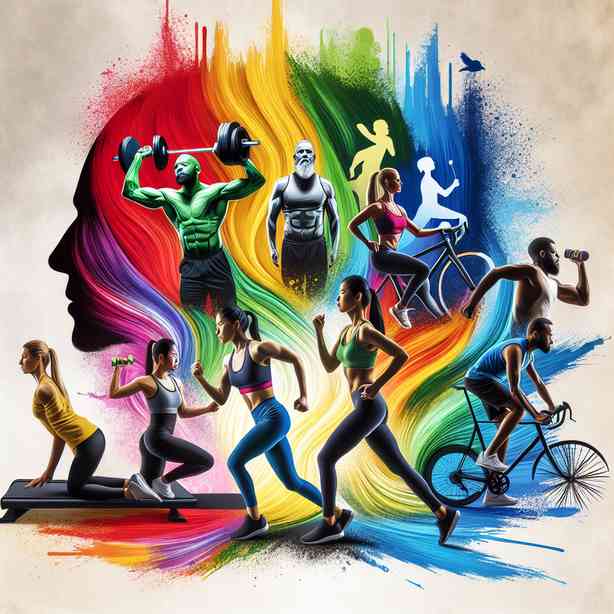
Fitness, for many people, transcends mere physical activity and becomes an integral part of their identity. As society increasingly celebrates wellness and healthy lifestyles, individuals often find themselves deeply intertwined with their fitness regimes. This evolving relationship can have both constructive and challenging implications. In this article, we will delve into how fitness can shape one’s identity, exploring the psychological, social, and cultural dimensions, and offer insights on maintaining a balanced approach to fitness without letting it define every aspect of life.
When we discuss the concept of fitness as identity, it is essential to consider the myriad ways in which individuals engage with physical health. For some, fitness might be a means of self-expression, a way to showcase physical prowess, endurance, and commitment. Classes packed with high-energy routines or outdoor adventures often provide a sense of belonging and community, as participants rally under a shared purpose of achieving health and aesthetic goals. This communal environment creates a bond that strengthens the identity of the fitness enthusiast. However, this strong association with fitness can also lead to feelings of inadequacy if one does not meet the arbitrary standards set by society or even by oneself.
Moreover, social media plays a formidable role in shaping fitness identities. Platforms like Instagram or TikTok are rife with fitness influencers who present curated images of their bodies and lifestyles. Consequently, many individuals compare themselves to these often unrealistic standards, internalizing fitness as a reflection of their worth. Such comparisons can lead to a narrow view of health, reducing it to a single narrative that equates fitness with a specific body type or lifestyle. The key here is to recognize that while fitness can enhance one’s sense of self, it is crucial to cultivate a more holistic understanding of well-being that includes mental health, emotional resilience, and individual values.
Furthermore, the psychology behind adopting fitness as part of one’s identity involves understanding motivations. Intrinsic motivations, such as the joy of movement, personal growth, and mental clarity, often lead to a more sustainable fitness journey than extrinsic motivations, which are typically based on external validation or societal expectations. When individuals engage in fitness activities because they genuinely enjoy them, they foster a positive relationship with exercise that transcends shallow pursuits like accolades or appearance.
However, it is imperative to be cautious when fitness dominates one’s self-concept. At times, the desire to be perceived as fit can lead to obsessive behaviors, disordered eating habits, and an unhealthy fixation on body image. The pressure to conform to a particular ideal can overshadow the original intentions behind pursuing a fitness journey, leading to burnout, injuries, and a detrimental relationship with food and exercise. Therefore, finding balance is essential. It is vital to approach fitness with flexibility, acknowledging days when motivation wanes and recognizing that it is entirely normal to experience fluctuations in one’s fitness journey.
On a social level, the community you build around fitness can enhance your identity in profound ways. Engaging with like-minded individuals who share your interests and values can foster a sense of belonging and support. Group classes, running clubs, or sports teams can offer not just camaraderie but also motivation and accountability. Furthermore, these scenarios create a space for sharing experiences and forging friendships that are centered on shared aspirations rather than competition. Celebrating collective achievements, no matter how small, contributes to a more cohesive identity rooted in health and collaboration rather than individualism.
Additionally, as individuals embrace fitness, it often leads to changes in other areas of their lives. People might find themselves making healthier choices outside of the gym, such as cooking nutritious meals, prioritizing sleep, and seeking mindfulness practices. This holistic approach can cultivate a lifestyle that reflects their values beyond physicality, integrating mental and emotional well-being into their overall health narrative. In this way, fitness becomes a tool for not only physical improvement but also personal development.
Moreover, it is worthwhile to consider the cultural context in which fitness identities are formed. Different cultures celebrate diverse forms of physical expression and health. The interpretation of fitness can vary widely—from dance-based workouts in vibrant communities to traditional martial arts reflecting cultural heritage. Such diversity allows individuals to redefine their identities by incorporating elements of their background, enhancing their sense of self and community involvement. An understanding of culture enriches the dialogue on what it means to be fit and encourages inclusivity in fitness narratives.
The impact of fitness on identity can also intersect with life transitions. For instance, major life events such as becoming a parent, changing jobs, or moving to a new city can prompt shifts in fitness engagement. Individuals may either intensify their commitment to fitness as a way to regain control or, conversely, might struggle to maintain their routines amidst new responsibilities. These changes emphasize the importance of adaptability; rather than adhering rigidly to a fitness identity, embracing flexibility allows individuals to adjust their practices in alignment with their current life circumstances. This adaptability ensures that fitness remains a positive force in life rather than a source of stress or guilt.
In conclusion, while fitness has the potential to enrich one’s identity, it is crucial to strike a balance that incorporates self-compassion and understanding. The key is to appreciate fitness as one aspect of a multifaceted identity, where personal values, social connections, and emotional well-being equally contribute to a comprehensive sense of self. This holistic approach shapes a sustainable relationship with health, allowing fitness to become a source of empowerment rather than a constraint. By redefining our connections to fitness, we open the door to a more inclusive, vibrant understanding of what it means to embody a healthy lifestyle, ultimately fostering a sense of unity and resilience within ourselves and in our communities.


